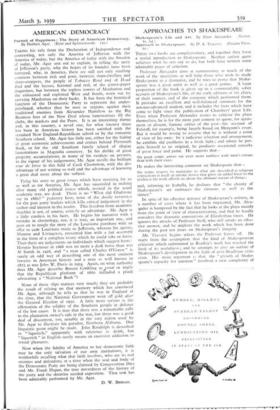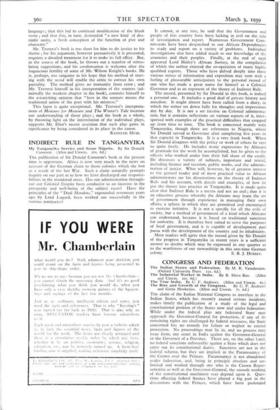APPROACHES TO SHAKESPEARE
THESE two books are complementary, and together they form
a useful introduction to Shakespeare. Neither author quite achieves what he sets out to do, but both have written some admirable pages of criticism.
Professor Alexander aims at summarising as much of the work of the specialists as will help those who wish to study Shakespeare as a dramatist, and he tries to prove that Shake- speare was a great artist as well as a great genius. A large proportion of the book is given up to a commendably sober account of Shakespeare's life, of the early editions of his plays, of their sources, and of the company which performed them. It provides an excellent and well-balanced summary for the not-too-advanced student, and it includes the facts which have come to light since the publication of Chambers' great Life. Even when Professor Alexander essays to criticise the plays themselves, he is for the most part content to quote, for agree- ment or dissent, famous critics of the past—his account of Falstaff, for examp'.e, being largely based on Morgann's essay. But it would be wrong to assume that he is without a point of view of his own : by a judicious selection and arrangement, he exhibits old problems in a fresh light ; and where he per-
mits himself to be original, he produces occasional remarks of great force and point. He suggests that— the great comic artists are even more ruthless with men's virtues than with their vices.
He makes the interesting comment on Shakespeare that—
the ironic reserve he maintains to what are described as religious convictions is itself an artistic device that gives an added force to the evidence his work affords us about the ultimate nature of things;
and, referring to Isabella, he declares that " the charity of Shakespeare's art embraces the virtuous as well as the sinner."
In spite of his effective defence of Shakespeare's artistry, in a number of cases where it has been impugned, Mr. Alex-
ander is hampered by the fact that he looks at the plays mainly from the point of view of characterisation, and that he hardly considers the dramatic conventions of Elizabethan times. He ignores the attacks of Professor Stoll, who still awaits an effec- tive answer, and he neglects the work which has been done during the past ten years on Shakespeare's imagery.
Mr. -Traversi begins where the Professor leaves off. He starts from the assumption that the kind of Shakespearean
criticism which culminated in Bradley's work has reached the limit of its usefulness ; and he attempts to give an outline of Shakespeare's development in the light of post-Bradleian criti- cism. His main argument is that the " growth of Shake- speare's capacity for emotion " involved a new complexity of language ; that this led to continual modification of the blank verse ; and that this, in turn, demanded " a new kind of dra- matic unity, a fresh conception of the function of plot and character."
Mr. Traversi's book is too short for him to do justice to his theme ; for his argument, however persuasively it is presented, requires a detailed treatment for it to make its full effect. But, in the course of the book, he throws out a number of stimu- lating suggestions, and his condensation is welcome after the loquacious fertility of some of Mr. Wilson Knight's books. He is, perhaps, too sanguine in his hope that his method of start- ing with the word will enable the critic to correct his own partiality. The method gives no immunity from error ; and Mr. Traversi himself in his interpretation of the sonnets (ad- mittedly the weakest chapter in the book), commits himself to the astonishing opinion that " love in the sonnets means the traditional union of the poet with his mistress."
This lapse is quite exceptional. Mr. Traversi's interpreta- tions of Measure for Measure and The Winter's Tale increase our understanding of those plays ; and the book as a whole, by throwing light on the interrelation of the individual plays, supports Mr. Eliot's recent assertion that each play gains in significance by being considered in its place in the canon.
KENNETH MUIR.



























































 Previous page
Previous page